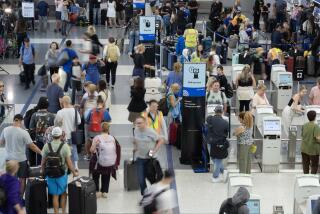CONSUMERS : Airline No-Shows Versus Overbooking
- Share via
Question: Isn’t anything at all being done to keep the airlines from constantly over-booking their seats and bumping us passengers at great inconvenience to us?
I had a confirmed reservation, and my ticket in hand, for a return to Los Angeles after spending Christmas with friends in Phoenix. I had to stay over an additional night because America West had overbooked the return by six seats. And I didn’t even have my luggage, which did make the flight. America West did, however, refund my Phoenix-to-L.A. fare. I know--and am not entirely unsympathetic to the airlines--that they have so many “no-shows” for every flight, but surely at Christmas they must know that almost everybody with a ticket is going to show up, so why not eliminate the overbooking entirely? Or, at least, give priority to those who have already bought, and hold, their tickets?
Also, it seems to me, with today’s computers, the airlines could “talk” with each other, compare passenger lists and cancel duplicate reservations.--L.S.
Answer: A nice piece of irony here--your luggage had better luck with America West than you did. It’s a sticky and never-ending source of friction between the airlines and the public, because heck hath no fury like a passenger left standing at 2 o’clock in the morning in a drafty air terminal with a ticket in his hot hand that isn’t worth the paper on which it’s printed. The problem, according to Stephen Brobeck, executive director of the Consumer Federation of America and co-author (with Jack Galas) of the CFA’s “How to Fly” book (subtitled “An Airline Survival Guide”), wouldn’t exist if it weren’t for the no-shows among us--those passengers who see nothing tacky about making three reservations for the same day on different airlines and then showing up to claim only one of them. No-shows, Brobeck said, amounted to about 7 million passengers in ‘86, and while most passengers with reservations did manage to get on their flights, an angry 200,000 in that same year ended up as you did--cooling their heels in the terminal.
“And while it’s true,” he adds, “that computers would make it possible for the airlines to check for duplicate reservations, I’m afraid that it just wouldn’t work--you can always use your brother’s name or an outright phony name. There’s always a way.”
Because airlines can’t increase their capacity simply to accommodate a couple of peak travel periods each year and because economic survival demands that the highest percentage of possible seats be filled, Brobeck says “a crunch at Christmastime is inevitable.” Is there a solution? “We’ve been trying several things,” Dick Schimizu, America West’s corporate communications spokesman in Phoenix, says.
Key Strategy
The key strategy here, Schimizu adds, is to offer attractive fares, but to make them either nonrefundable or, at least, to require prepayment and with a penalty for the no-shows. “We’re trying something else new, and I think America West may be alone in this. We have what we call ‘flight-firming.’ We call passengers with reservations to double-check that their plans haven’t changed. But it’s tedious and time-consuming and it may be too early to know how well it is working.”
Brobeck, who suspects that the airlines do increase their overbooking at the holidays, believes that the carriers could discourage the no-shows more vigorously than they do, by resorting to the very thing you recommended: giving first priority on overbooked flights to passengers actually holding tickets for which they have already paid.
As it stands now, he adds, “priority goes to those who check in first.”
But perhaps the closest near-solution to overbooking, Brobeck says, may be in consumer insistence that the airlines enhance their offers to bumped passengers to switch voluntarily to a later flight--the standard inducement that, in ‘86, a full 70% of bumped passengers accepted. The goad here is Federal Aviation Administration regulations that passengers bumped involuntarily not only are entitled to a refund of their ticket but--depending on the length of the delay involved--must be further compensated anywhere from $200 to $400 for the inconvenience.
‘Might Think Twice’
“So, why not let the free market place really work?” Brobeck asks rhetorically. “If airlines want to overbook by 30%--the average is supposed to be 20%, but no one knows for sure--then let them do so. But if they’re up to capacity and have to give away, for instance, a number of free round-trip tickets to the Far East, they might think twice about their overbooking policy and scale it back to 10% or 15%.”
In short, there’s no really satisfactory answer, at the moment, to the annoying position you found yourself in--out on the street--right after Christmas.
More to Read
Sign up for The Wild
We’ll help you find the best places to hike, bike and run, as well as the perfect silent spots for meditation and yoga.
You may occasionally receive promotional content from the Los Angeles Times.






